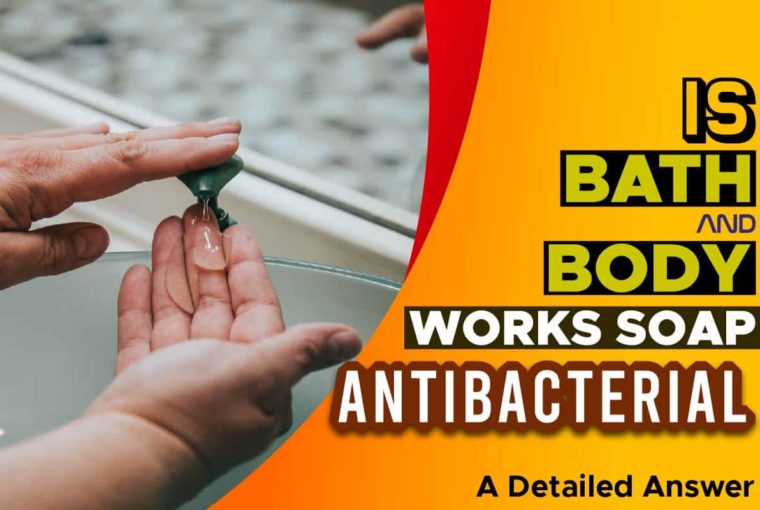When it comes down to picking a hand soap, Bath and Body Works is undoubtedly among the first names that pop up due to its magnificent variety of soaps. However, none of the company’s soaps are labeled as antibacterial. So, a question naturally arises, “Is Bath and Body Works soap antibacterial?”
Yes, this brand’s soaps are definitely antibacterial. Any soap can kill bacteria effectively when you lather up your hands and wash them thoroughly over 20 seconds. Bath and Body Shop soaps are no exception.
However, these hand soaps are not labeled as antibacterial soaps because they do not use certain powerful germ-killing ingredients required for soaps to be labeled as antibacterial.
Why Bath And Body Works Hand Soaps Are Our Favorite Pick
Bath and Body Works has become a household name, thanks to its wide range of unique scents, luxurious soap blends that are gentle to your skin, and boast sophisticated packaging for a clean look. Their hand soaps are one of the most raved-on products due to the use of high-quality ingredients in production.
Aloe vera to soothe skin, shea extract to keep your hands nourished, a wide assortment of essential oils that are gentle to the skin, and exclusive aromas that remind you of a warm fall morning on the brightest day of summer.
The brand strives to tick off all your criteria when it comes to soaps. They have a soap for you, no matter what ingredient, scent, skin type, or concern you might have.
How The Spreading Of Deadly Coronavirus Increased Sales Of Bath And Body Works
Bath and Body Works has a vast collection of scented soaps and hand sanitizers. Due to the deadly virus, everyone in the world must keep their hands clean and germ-free at all times. So when people started spending more bucks on soaps than ever before, the brand Bath and Body Works was right on top of their lists.
As we constantly wash and sanitize our hands these days, we make the skin dry from harsh chemicals and alcohol. So, people started looking into superior quality products that will not drain away moisture from the skin and make the mundane task of washing hands a bit more fun.
And this company’s utmost care in picking out hydrating and nourishing oils does an excellent job of making us come back for more. Its wide range of hand soaps boasts pleasant scents, colorful soap blends and offers tons of health benefits.
The Difference Between Liquid And Bar Soap
When it comes down to effectively killing germs and deadly viruses, both liquid and bar soap are equally effective. However, you have to make sure that you are taking at least 20 seconds to wash your hands properly.
After the spreading of the Covid-19 virus, we wash our hands with more precision and at least ten times more than we used to in a day. And when you are constantly sanitizing or washing your hands, liquid soaps can be an excellent choice as most soaps have moisturizing ingredients and oils incorporated into the formula.
As for bar soaps, you have to directly rub them against your skin to lather up, which in turn creates the right amount of friction to remove both germs and dirt particles from your skin.
Bar soaps may collect germs on the surface of the soap if you keep them in an open area, though this accumulation of germs is proven to be harmless scientifically.
Can You Skip On Antibacterial Soaps Entirely
You can entirely lean towards traditional soaps and skip on antibacterial soaps. Antibacterial soaps have some additives that might be harsh on your gentle skin.
In fact, scientists have discovered that the ingredients used to brand soaps as antibacterial might have detrimental effects on your overall health. Triclosan alone can disrupt your thyroid hormone metabolism and can be linked to the causes of cancer.
So why splurge money on antibacterial soaps when traditional ones can do a better job at effectively killing bacterias and keeps your hands smelling heavenly at the same time.
Antibacterial Soaps Might Do Serious Damage To Your Health
Most antibacterial soaps contain the ingredient called Triclosan. Soaps with Triclosan can effectively kill viruses and bacterias, which is why brands include this ingredient in their antibacterial soaps.
However, this particular additive alone can be linked to many health problems. You can suffer from the side effects of Triclosan by mere skin contact. In fact, it is prohibited in many countries to use Triclosan in their soaps or consumer products anymore.
Frequently Asked Questions
1. Are all hand soaps antibacterial?
No, not all hand soaps are labeled antibacterial, but if you use any traditional soaps and wash your hands for long enough, you can kill up to 99% of germs and viruses.
2. Which scented Bath and Body Works hand soaps would be perfect for getting started?
You can pick any scent you love! If you are unsure about exotic scents, grab a good old citrusy or floral scented soap. In case you are feeling quite nostalgic about your last trip to the beach in the middle of a stormy winter, grab a tropical scent!
3. Which soap should I pick for dry or sensitive skin types?
The creamy, nourishing range of hand soaps will make the perfect addition to your sink if you are looking for a soap for dry skin. For sensitive skin, pick any soap with a gel base, and you are good to go!
Conclusion
Now, is Bath and Body works soap antibacterial?
Despite not having the label of antibacterial hand soap, Bath and Body Works hand soaps do a perfect job of killing bacterias and keeping you safe from diseases. Considering the adverse effects of Triclosan, staying away from antibacterial soaps is probably in your best interest.
So, best not to bother with the antibacterial label when we have an excellent soap collection that checks all the boxes in our checklist.




